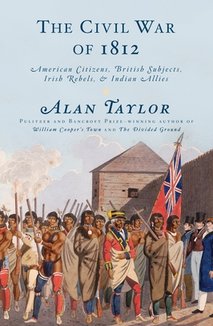
25 Oct 2010 13:33:28
The War of 1812 doesn't get a lot of attention these days; many Americans know it vaguely as something like an addendum to the RevolutionaryWar.
Pulitzer Prize-winning historian Alan Taylor gives a fascinating account of the war and shows its importance to the fragile new republic in a book filled with stories about the people who instigated, commanded and fought in the conflict.
Taylor explains the tensions that led to the war, particularly the Royal Navy's habit of snatching American merchant sailors off ships for service. And he explains the internal partisan currents that hobbled the republic's war efforts — Federalists were largely against the war, meanwhile Republicans wanted the glory of war but didn't want to raise taxes to pay for it.
But in "The Civil War of 1812," Taylor mostly focuses on the campaigns along the then-spongy Canadian border. He notes that the war between the British and the United States was essentially fought between people of the same culture and customs who were recently divided by the Revolution. That's why Taylor calls it a civil war.
This is a book packed with an army of characters, from ill-equipped soldiers to bumbling politicians in Washington. Taylor is especially adept at conjuring the cold misery that was 19th- century army life.
Taylor can be tart, especially when assessing military and political leaders. One general is described as "insecure, fat, slow, and accident prone." The author notes that President Thomas Jefferson was reluctant to draw militia from Southern states before the war because they were needed there to keep slaves from revolting. Taylor writes that "in Jeffersonian plans, the war would liberate Canada while defending slavery in the American South."
It almost seems like a miracle that the new nation wasn't routed by the British. Some Federalist officers appeared to have a greater affinity with the British than their Republican countrymen. Meanwhile, rank-and-file soldiers, weaned on tales of the "savage" Indians allied with the British, were petrified at the thought of actually meeting them in battle. And because the administration tried to wage war on the cheap, the army was poorly trained, clothed and fed.
The British might have won the war just by running out the clock on the financially struggling republic. But because of their own international entanglements, they gave enough concessions in a peace treaty so that the Americans could claim victory.
Pulitzer Prize-winning historian Alan Taylor gives a fascinating account of the war and shows its importance to the fragile new republic in a book filled with stories about the people who instigated, commanded and fought in the conflict.
Taylor explains the tensions that led to the war, particularly the Royal Navy's habit of snatching American merchant sailors off ships for service. And he explains the internal partisan currents that hobbled the republic's war efforts — Federalists were largely against the war, meanwhile Republicans wanted the glory of war but didn't want to raise taxes to pay for it.
But in "The Civil War of 1812," Taylor mostly focuses on the campaigns along the then-spongy Canadian border. He notes that the war between the British and the United States was essentially fought between people of the same culture and customs who were recently divided by the Revolution. That's why Taylor calls it a civil war.
This is a book packed with an army of characters, from ill-equipped soldiers to bumbling politicians in Washington. Taylor is especially adept at conjuring the cold misery that was 19th- century army life.
Taylor can be tart, especially when assessing military and political leaders. One general is described as "insecure, fat, slow, and accident prone." The author notes that President Thomas Jefferson was reluctant to draw militia from Southern states before the war because they were needed there to keep slaves from revolting. Taylor writes that "in Jeffersonian plans, the war would liberate Canada while defending slavery in the American South."
It almost seems like a miracle that the new nation wasn't routed by the British. Some Federalist officers appeared to have a greater affinity with the British than their Republican countrymen. Meanwhile, rank-and-file soldiers, weaned on tales of the "savage" Indians allied with the British, were petrified at the thought of actually meeting them in battle. And because the administration tried to wage war on the cheap, the army was poorly trained, clothed and fed.
The British might have won the war just by running out the clock on the financially struggling republic. But because of their own international entanglements, they gave enough concessions in a peace treaty so that the Americans could claim victory.

